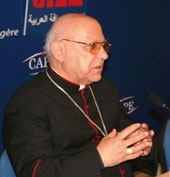 British Christian leaders --Anglican, Catholic, Orthodox and Protestant -- traveled to the holy places in the Occupied Palestinian Territories in recent days. The Archbishop of Canterbury laid the blame for current Muslim-Christian tensions in the area on his own government, the United States and the Israeli occupation.
British Christian leaders --Anglican, Catholic, Orthodox and Protestant -- traveled to the holy places in the Occupied Palestinian Territories in recent days. The Archbishop of Canterbury laid the blame for current Muslim-Christian tensions in the area on his own government, the United States and the Israeli occupation. This denunciation of western policies certainly accords with the the opinions we heard from refugee Iraqi Christians in Damascus last summer.Archbishop of Canterbury Rowan Williams, writing in The Times of London during a four-day swing through the region, bemoaned the state of Christians in the Muslim world.
"Iraq's Christian population is dropping by thousands every couple of months and some of their most effective leaders have been forced to emigrate. In Istanbul, the Orthodox population is a tiny remnant, and their patriarch is told by some of the Turkish press that it's time he left. In Egypt, where Christian-Muslim relations have been - and still are - intimate and good, attacks on Christians are notably more frequent," Williams wrote. ...
On his visit to Bethlehem, for example, Williams wrote that the town's Christian population is down to "barely a quarter," and, "There are some disturbing signs of Muslim anti-Christian feeling, despite the consistent traditions of coexistence. But their plight is made still more intolerable by the tragic conditions created by the 'security fence' that almost chokes the shrinking town."
Williams admits that the situation was "difficult" for Christians across the region before the war in Iraq and Israel's security fence, but clearly blames the perception that Christians are part of the "crusading West" for exacerbating the situation.
 Rami Khouri reports these Christmas thoughts from Latin Patriarch of the Holy Land, Michel Sabbah.
Rami Khouri reports these Christmas thoughts from Latin Patriarch of the Holy Land, Michel Sabbah. Archbishop Sabbah is not some Pollyanna. He is Palestinian by birth, appointed by Pope John Paul II as the highest ranking Roman Catholic cleric in the region. His purview includes Christian holy sites in Jerusalem and the West Bank city of Bethlehem, located just 20 minutes apart, but cut off from each other by the Israeli occupation. Bethlehem in particular has been crippled, its agricultural lands made inaccessible by to its residents by the Israeli wall, its pilgrim and tourist traffic cut off by arbitrary military check points and "closures." Yet he seeks a way forward in not only justice, but also in understanding and love."My vision is that we [Palestinian] Christians, whatever are our numbers, are Christians in and for our society, which is a Moslem Arab society. Christians have something specific to give as Christians, because of their belief in Jesus Christ and all the values that Jesus Christ taught us. This is an obligation. Our commandment is a commandment of love, and it is shows the way to build a society. Christian love is about accepting the other or not accepting him. It is about building with the other or refusing to build with him. All the Christian Arabs can bring to Arab society this love as a power of cohesion within the society to love themselves and show how to live together with the Moslems who are the majority in these societies. ...
"We Christians can be a true bridge through all the churches that are present in the world," he replied to my question about Arab Christians playing a role as bridges with the West. "All of us together can have an impact. We have an obligation to understand Islam for what it is, therefore we have the obligation even to have alliances with Moslems, in order to build a new type of society, and bring this as a model of coexistence to the West."
In a time when the Guardian newspaper in the United Kingdom trumpets that most Britons believe that "religion does more harm than good," maybe hope comes from quarters where we might least expect peace and goodwill to break through.
No comments:
Post a Comment